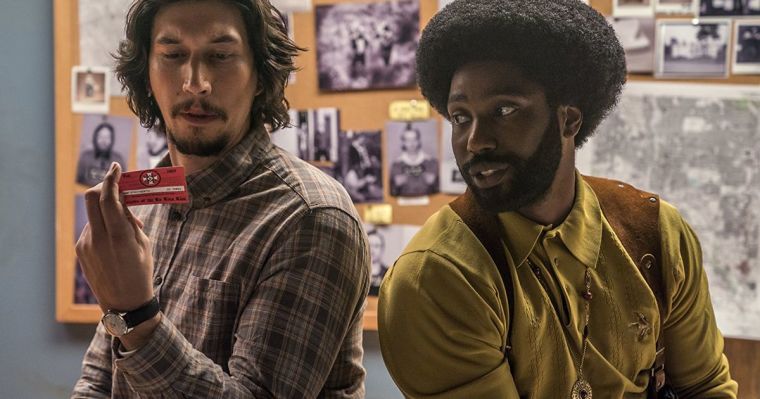3 min to read
BlacKkKlansman
Lee's Klan comedy is sleek, funny, but ultimately cartoonish. BlacKkKlansman never quite achieves the impact it shoots for.
by Zach Saul

Lee’s Klan comedy is sleek, funny, but ultimately cartoonish. BlacKkKlansman never quite achieves the impact it shoots for.
Spike Lee’s new Klan dramedy is centered around a black man (Ron Stalworth) who’s making the ultimate prank call, and carries the charade through to the very end. Ron is blisteringly confident, unencumbered, and unapologetic about being the first black policeman in Colorado, and pulls no punches in his pursuit of David Duke and the KKK. Ron manages to ingratiate himself into both the police station’s good graces, and the Black Student Union’s, both to investigate the Klan’s activities, and hit on the dashing Patrice (Laura Harrier). With the help of his partner Flip (Adam Driver), Ron manages to gain the favor of the Klan members, and even obtains a membership card from the grand wizard (David Duke) himself.
Ron’s identity is tested throughout the movie, as Patrice and his police stations are tugging him in two directions. Ron believes, and does his best to show the “pigs”, and the “panthers” aren’t as different as they think they are, but at no point does this argument resonate with Patrice. We can feel this identity crisis weighing on Ron throughout the movie, and it provides an tension to accompany his character. Although he desperately want to be with Patrice, and not (in her words) “abandon his people”, Ron has a strong desire to fight from within the system, citing this as a reason for choosing police work. BlackKkKlansman is careful not to sharpen too many knives against either group, and in moments of conflict chooses a lighter mood or a piece of comedic relief in place of a passionate soliloquy.
Lee’s depiction of the Klan is fairly light in tone, and much more cartoonish than it is creepy. Jasper Pääkkönen’s Felix (the creepiest of the Klansman) feels more like an excerpt from Inglorious Bastards than it does a peek behind the white supremacist curtain. To a large extent it’s fun to sit in Lee’s universe and gawk at how outlandish it is to hear Adam Driver say the N word 15 times in a single scene, and then cross those same bigots moments later. If Lee’s film wanted to highlight how real these sentiments are even today, and that they aren’t far from the truth, (the scenes of Trump, Charlottesville and Duke at the end insinuate as much) why didn’t the film take its portrayal of white supremacy more seriously?
I found the tonal shifts in BlacKkKlansman difficult to reconcile with this depiction. The police station’s institutional racism is largely shrugged off, and by the end of the film Ron seems largely unfazed by the Klan’s attack, and his employer’s dismissal for his investigation. Was this choice by director Spike Lee a vaguely nihilist commentary about ambivalence toward injustice?
The Good: BlacKkKlansman adopts very interesting source material into an entertaining summer comedy, and features a killer soundtrack and good performances from Washington, Driver, and Pääkkönen.
The Bad: As happens all too often in no-fiction movie adaptations, there’s not nearly enough character development for the conflicts in BlacKkKlansman to resonate. We understand more about peripheral characters than Stalworth’s, and the Klansman just aren’t creepy enough to give the final sequences the impact they deserve.
| Movie Details | |||||
|---|---|---|---|---|---|
| Studio: | |||||
| Director: | Spike Lee | ||||
| Written By: | |||||
| Staring: | John David Washington | Adam Driver | Laura Harrier | ||

Comments